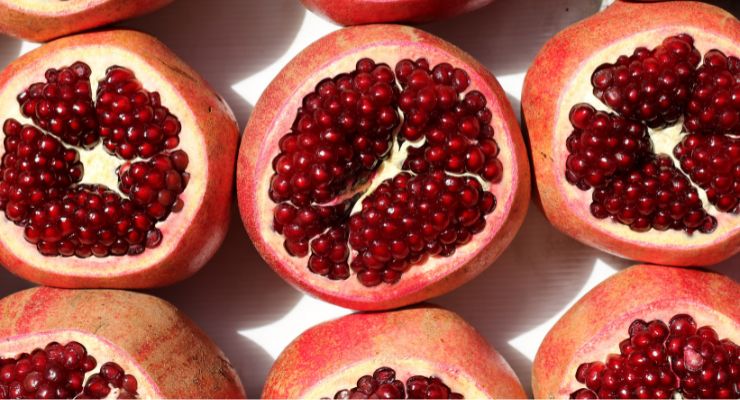10.09.23
A new pharmacokinetic study revealed a potential mechanism of action responsible for the gut health benefits associated with a pomegranate extract branded as Pomella by Verdure Sciences. The study was conducted by the National Center for Natural Products Research (NCNPR) at the University of Mississippi.
Using ultra-high performance liquid chromatography-tandem mass spectrometry (UHPLC-MS/MS), the researchers investigated the metabolism of Pomella extract with an emphasis on the major polyphenol punicalagin, which is an ellagitannin. The assay also measured the gut microbial metabolites urolithin A (UA) and urolithin B (UB).
The authors of the study recruited two different groups to investigate the activity of a 250 mg dose as well as a 1,000 mg dose. Over 48 hours, plasma samples were collected and analyzed for both conjugated and unconjugated forms of ellagic acid, UA, and UB.
The study demonstrated that punicalagins rapidly metabolize to ellagic acid, which was rapidly absorbed and conjugated after oral administration. Conjugated ellagic acid reached concentrations between five- and eight-times higher than unconjugated EA for both dose groups.
UA appeared in the bloodstream about eight hours after dosing, supporting the hypothesis that gut microbes metabolize ellagitannins to ellagic acid, and then to urolithins. Only urolithin A was found in both cohorts, but not urolithin B, and there was a dose-dependent response to the conjugated forms of ellagic acid and urolithin A, with the 1,000 mg dose experiencing a two-fold increase in the area under the curve compared to the 250 mg group.
The study supports Pomella’s capabilities for gut health, and speaks to recent health interest in the way that specific gut microbes like Eggerthellaceae and Akkermansia muciniphila can metabolize ellagitannins to urolithin A, and the downstream health benefits associated with this mechanism.
“We are excited to have this new publication join the mounting evidence in support of Pomella,” said Kristen Marshall, digital marketing manager with Verdure Sciences. “Tremendous interest continues to build for gut and digestive health, skin support, and beauty from within as well as specific gut and skin microbiota. Having evidence supporting the roles in metabolizing ellagitannins to urolithins in the gut truly helps to explain the positive prebiotic benefits Pomella has to offer.”
Using ultra-high performance liquid chromatography-tandem mass spectrometry (UHPLC-MS/MS), the researchers investigated the metabolism of Pomella extract with an emphasis on the major polyphenol punicalagin, which is an ellagitannin. The assay also measured the gut microbial metabolites urolithin A (UA) and urolithin B (UB).
The authors of the study recruited two different groups to investigate the activity of a 250 mg dose as well as a 1,000 mg dose. Over 48 hours, plasma samples were collected and analyzed for both conjugated and unconjugated forms of ellagic acid, UA, and UB.
The study demonstrated that punicalagins rapidly metabolize to ellagic acid, which was rapidly absorbed and conjugated after oral administration. Conjugated ellagic acid reached concentrations between five- and eight-times higher than unconjugated EA for both dose groups.
UA appeared in the bloodstream about eight hours after dosing, supporting the hypothesis that gut microbes metabolize ellagitannins to ellagic acid, and then to urolithins. Only urolithin A was found in both cohorts, but not urolithin B, and there was a dose-dependent response to the conjugated forms of ellagic acid and urolithin A, with the 1,000 mg dose experiencing a two-fold increase in the area under the curve compared to the 250 mg group.
The study supports Pomella’s capabilities for gut health, and speaks to recent health interest in the way that specific gut microbes like Eggerthellaceae and Akkermansia muciniphila can metabolize ellagitannins to urolithin A, and the downstream health benefits associated with this mechanism.
“We are excited to have this new publication join the mounting evidence in support of Pomella,” said Kristen Marshall, digital marketing manager with Verdure Sciences. “Tremendous interest continues to build for gut and digestive health, skin support, and beauty from within as well as specific gut and skin microbiota. Having evidence supporting the roles in metabolizing ellagitannins to urolithins in the gut truly helps to explain the positive prebiotic benefits Pomella has to offer.”




























